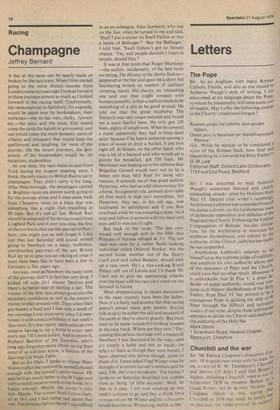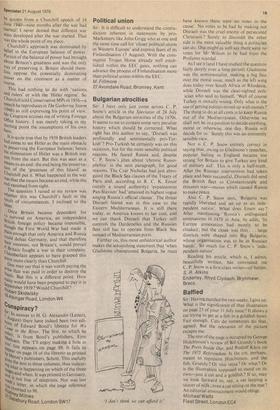Churchill and the war Sir : Mr Patrick Cosgrave's eloquence
(Ley ters. 14 August) runs away with his logic. I.?, my review of R. W. Thompson's Church'," and Morton (31 July) I said that Britain s leaders, including Churchill, went to war In September 1939 to preserve Britain as ar Great Power, not to destroy Nazism. that ( osgravc objects to this, saYing Par Churchill in 1939 was ready to justify wal on precisely the latter ground. In suPIN)r he quotes from a Churchill speech of 18 June 1940--nine months after the war had started! I never denied that different war aims developed after the war started. That Was the whole point of my piece.
Churchill's approach was dominated by belief in the European balance of power.
Pursuit of the balance of power had brought about Britain's greatness and was the only Way of preserving it. Britain should therefore oppose the potentially dominating Power on the continent as a matter of Course.
This had nothing to do with 'nations and rulers' or with the 'Hitler regime'. So Churchill told Conserv,ative.MPs in 1936—a skech he reproduces in The Gathering Storm (1.948) as still expressing his point of view. . Cosgrave accuses me of writing Foreign Office history. I was merely taking as my starting point the assumptions of his own hero.
It is quite true that by 1939 British leaders had come to see Hitler as the main obstacle to Preserving the European balance; hence the elimination of Hitler was a British war ajar from the start. But this was seen as a nteans to an end : the end being the preservation of the 'greatness of this Island' as Churchill put it. What happened in the war was that the means became an end, while the end vanished from sight. The question I raised in my review was Whether this was Churchill's fault or the result of circumstances. I inclined to the latter.
. Once Britain became dependent for survival on America, an independent ritish foreign policy became impossible, `Taugh the First World War had made it plain enough that only America and Russia ctic'uld defeat Germany, and that therefore ,etr interests, not Britain's, would prevail Britain fought a war in their company. hatnberlain appears to have grasped this 1301nt more clearly than Churchill. Pile may say that it was worth paying the NrIee tbat was paid in order to destroy the 41415. But this is a different point. How seanY would have been prepared to pay it in
ptentber 1939? Would Churchill ?
in°13ert Skidelsky
'0 Abinger Road, London W4



































 Previous page
Previous page